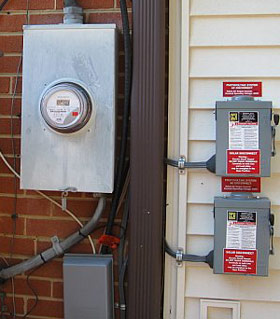The Basics of Net Metering
You probably never heard of net metering until you were about ready to install your solar energy system. This article is meant as a primer for those who are considering installing a home solar panel system and who want to know what all this net metering business is all about.
Net metering is a system whereby customers who generate their own electricity are able to interconnect with the central grid and monitor their net electricity consumption via one or multiple meters. Go outside your home and you find your electric meter. This is what the utility guy reads every month so that you can pay your very complicated electric bill.
Now you have installed that solar energy system on your roof and at some times during the day you are producing more electricity than you are consuming. And look at your meter now-it is actually rolling backwards. That is where net metering comes into play.
With net metering, when the electricity you generate exceeds your usage, the excess electricity you provide to the utility offsets the electricity you purchase from the utility at another time during the same billing period. In other words, the customer uses any excess generation from one billing period to offset electricity he or she would have otherwise had to purchase at the utility's retail rate. These offsets are usually granted to the customer in the form of credits that may be rolled over to future electric bills for a specified amount of time.
Since most electricity meters already accurately record in both directions, net metering is a low-cost and easily administered way to promote direct customer investment in renewable energy. Furthermore, by compensating customers for reducing demand and sharing excess electricity, net metering programs are powerful, market-based incentives that states can use to encourage energy independence.
The federal government has essentially remained silent on net metering, leaving each individual state to craft its own policy on net metering. Forty-three states plus the District of Columbia have net metering policies that allow customers to offset the electricity they purchase from the utility with customer-generated renewable power. These policies, however, are anything but uniform and the watts (dollars) are in the details. You need to know the particular net metering law that applies to you.
While some states' net metering policies apply to customers of all types of utilities (e.g., investor-owned utilities, municipal utilities and electric cooperatives), others apply only to customers of investor-owned utilities. In addition, state policies vary widely by several other key criteria, including individual system capacity limit, aggregate system capacity limit, treatment of net excess generation (at the end of a billing period), and ownership of renewable energy credits (RECs) associated with customer generation. We will talk about some of the policies underlying the debate on net metering in another article on net metering policy options.
